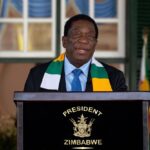Yesterday marked a significant milestone in Zimbabwean history as it commemorated the fourth anniversary of the passing of Robert Mugabe. Mugabe, who served as Zimbabwe’s first post-independence leader for a staggering 37 years until 2017, left behind a complex legacy that continues to exert a profound influence on the country’s politics and society.
Mugabe died in Singapore on September 6, 2019 at the age of 95. He had been forced to resign two years prior by his military. Even in death, Mugabe remains a polarizing figure in Zimbabwe.
His time in power saw both successes and failures. He emerged as a prominent leader of the movement to end colonial Rhodesian rule and white minority government. Under his leadership, Zimbabwe gained independence in 1980 after a protracted liberation struggle.
However, Mugabe’s later years in office became defined by dictatorial behaviour, according to critics. He relentlessly cracked down on political opposition and solidified one-party dominance by ZANU-PF. Over time, democratic norms and institutions faded away.
Economically, Mugabe’s policies are blamed for the country’s downturn. Hyperinflation reached astronomical levels in 2008 due to money printing, and foreign investment dried up due to political instability. The agricultural sector was particularly damaged by the fast-track land reforms starting in 2000.
While the goal was to correct colonial land imbalances, implementation problems led to violent evictions of white commercial farmers. Food production plummeted, and Zimbabwe became a net importer despite once feeding all of Southern Africa. Widespread poverty and unemployment followed.
Mugabe’s supporters counter that decisive action was needed to redistribute land and empower the black majority population after decades of minority white ownership. They credit him for playing a leading anti-colonial role across Africa as well.
The land reform debate taps into broader discussions around decolonization. Did Mugabe go too far too fast, or was radical economic change necessary to achieve social justice after the liberation struggle? Reasonable people disagree on where to draw the line.
Four years on, Mugabe’s mixed legacy continues influencing Zimbabwe’s politics. His successor Emmerson Mnangagwa has established himself but still utilises an authoritarian governing style. Ongoing economic crises also stem partly from Mugabe-era policies according to analysts.
Alternately, others argue that Mnangagwa has merely refined the same repressive system without enacting real political reforms.
Regardless of perspectives, Mugabe inarguably reshaped Zimbabwe and remains a towering figure in its post-colonial history. Debates around how to assess his 37-year rule will likely endure for decades more. As the nation pauses to remember the late leader, questions over his complex legacy persist.











